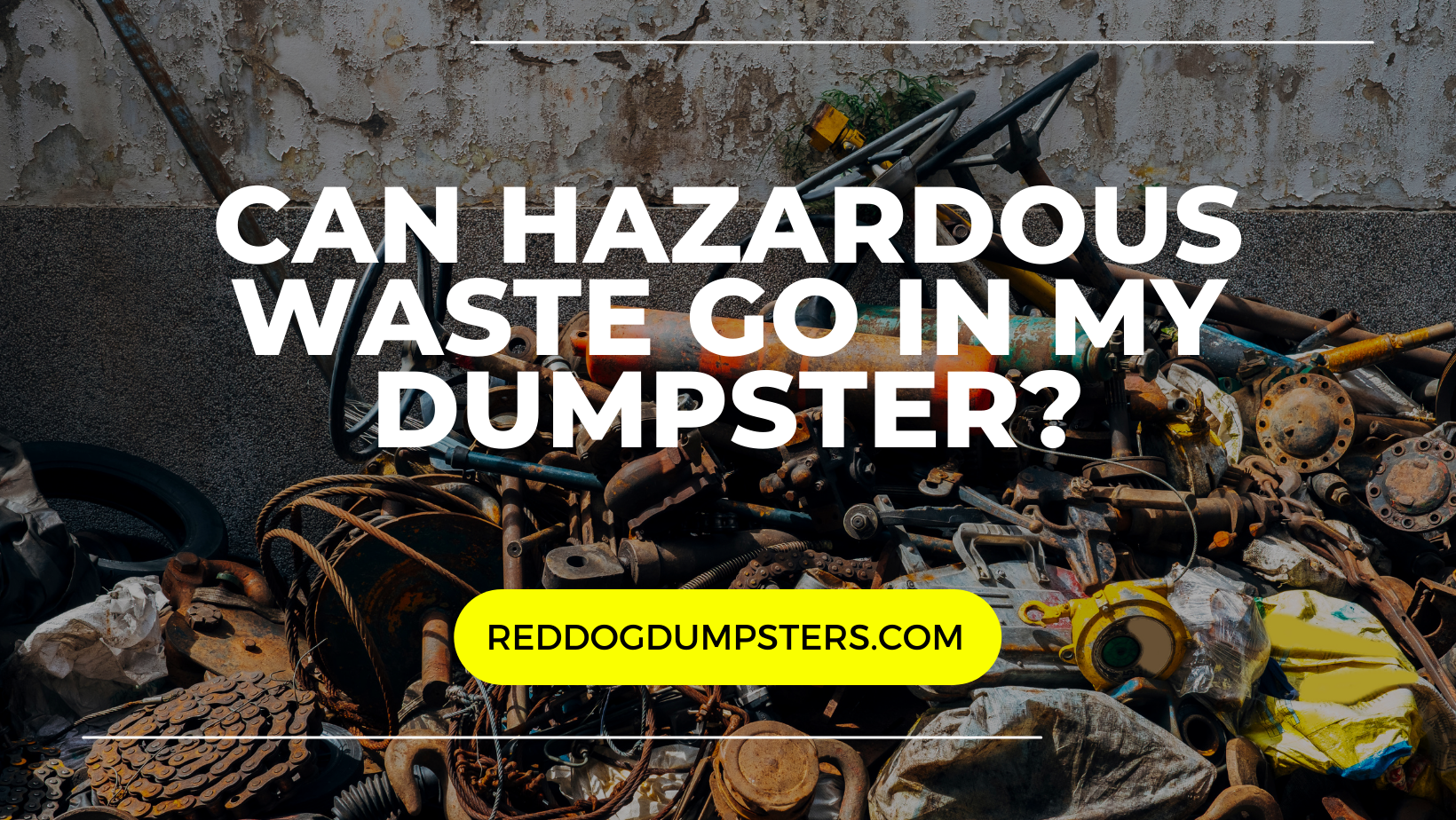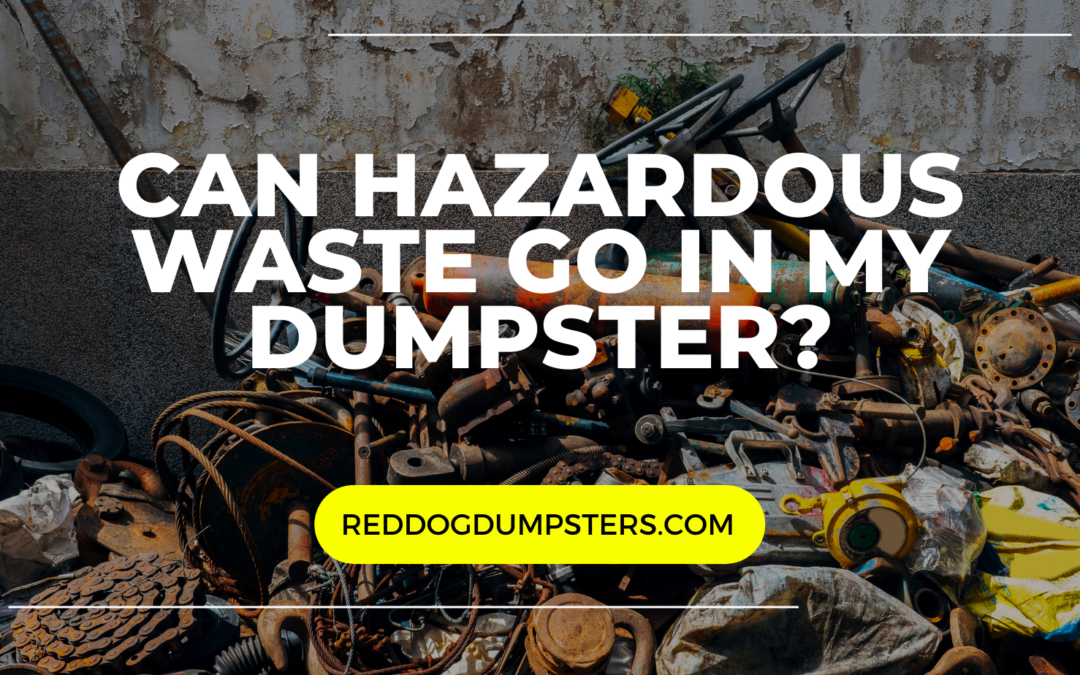
When you embark on a home renovation project, a thorough spring cleaning, or decide it’s time to bid farewell to some items during a yard sale gone wrong, a residential dumpster rental can be your saving grace. Dumpsters are like magic portals for decluttering and waste removal. However, it’s essential to understand that not everything can find its way into the dumpster, especially when it comes to hazardous waste.
At Red Dog Dumpsters, we frequently encounter two questions from our customers: “Is there anything that can’t go into the dumpster?” and “What is considered household hazardous waste?” In this blog post, we’ll provide you with the answers you need to ensure responsible waste disposal. But first, let’s take a closer look at what constitutes household hazardous waste.
Household Hazardous Waste: Common Examples
While it might be physically possible to toss just about anything into a dumpster, it’s crucial to recognize that certain materials should never make their way into a residential roll-off dumpster rental. Household hazardous waste encompasses a range of items that can be harmful to the environment, public health, and safety. Here are more than 10 common examples of household-related products that cannot be disposed of in our dumpsters:
- Propane Tanks: These pressurized containers can pose a significant risk if punctured or damaged.
- Ammunition: Bullets, shells, or other ammunition components can be extremely dangerous when exposed to heat or impact.
- Paint and Paint Products: Leftover paint, paint cans, paint thinner, stains, and varnish fall into this category. These products often contain harmful chemicals.
- Household Cleaning Products: Items like bleach, corrosive cleaners, and drain cleaners can be dangerous if not handled properly.
- Batteries: Batteries, especially those containing hazardous materials like lead-acid batteries, should be disposed of carefully.
- Fluorescent Light Bulbs: These bulbs contain mercury, a hazardous substance, and must be recycled properly.
- Tires, Motor Oil, Gasoline, and Antifreeze: These automotive materials require specialized disposal due to their environmental impact.
- Aerosol Cans: These can explode or release harmful chemicals when subjected to high temperatures or pressure.
- Pesticides and Fertilizers: These agricultural products can harm the environment and public health if not handled correctly.
- Pharmaceuticals and Bio-Medical Waste: Medications and medical waste require special disposal methods to prevent contamination.
Please note that dirt and masonry products are allowed in our dumpsters, but arrangements must be made at the time of your dumpster rental order.
How to Dispose of Hazardous Material Safely and Legally
Now that you know what constitutes household hazardous waste, it’s crucial to understand how to dispose of these materials safely and within the bounds of the law. Dumping hazardous waste down sinks, toilets, or sewers is not only illegal but also harmful to the environment. Likewise, leaving it out on the curb for trash day or attempting to burn it in a backyard bonfire are dangerous practices.
Here are four responsible hazardous waste disposal methods available in most municipalities:
- Permanent Waste Collection Facility: Many communities have designated waste collection facilities where residents can drop off unused or partially used household chemicals. Some of these locations even offer exchange programs, allowing others to recycle and reuse the items you’ve turned in.
- Designated Community Collection Days: In areas without year-round facilities, designated community collection days are often organized. These events may target specific types of hazardous waste, so be sure to stay informed about what’s being collected on a given day.
- Local Business Collection Sites: Periodically, local businesses, such as auto mechanic garages or hardware stores, transform their locations into waste collection sites. They may accept materials like used motor oil or propane tanks.
- Curbside Waste Pick-Up: Depending on the type of waste and local regulations, transporting hazardous materials to a collection site may not be ideal or even legal. Some communities offer curbside hazardous waste pick-up services, so check with city hall or local environmental agencies for availability.
Remember, responsible disposal of hazardous waste is not just a legal requirement but also an ethical responsibility to protect our environment and the well-being of our communities.
If you’re unsure about how to dispose of certain materials or need assistance with waste management, don’t hesitate to reach out to Red Dog Dumpsters. We are here to help you make informed and responsible choices when it comes to waste disposal.
For more information on our dumpster rental services and waste management solutions, please contact us at (615) 933-3300 or visit our website. Let’s work together to keep our communities clean and safe.

